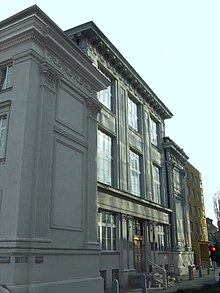Central Committee of Polish Jews
| Central Committee of Polish Jews Centralny Komitet Żydów w Polsce |
|
|---|---|

Headquarters of the Jewish Historical Institute in Warsaw, holding the entire archives of CKŻP
|
|
| Operation | |
| Founded | November 12, 1944 |
| Reformed | 1950, as Towarzystwo Społeczno-Kulturalne Żydów w Polsce |
| Location | Warsaw |
The Central Committee of Polish Jews also referred to as the Central Committee of Jews in Poland and abbreviated CKŻP, (Polish: Centralny Komitet Żydów w Polsce, Yiddish: צענטראל קאמיטעט פון די יידן אין פוילן; tr:Centraler Komitet fun di Jidn in Pojln) was a state-sponsored political representation of Jews in Poland at the end of World War II. It was established on November 12, 1944, as the successor of the Provisional Central Committee of Polish Jews formed a month earlier under the umbrella of the communist Polish Committee of National Liberation (PKWN). The CKŻP provided care and assistance to Jews who survived the Holocaust. It legally represented all CKŻP-registered Polish Jews in their dealings with the new government and its agencies. It existed until 1950 when, together with the Jewish Cultural Society, representatives of CKŻP founded the Socio-Cultural Association of Jews in Poland.
The Committee was instrumental in organizing and implementing the Jewish aliyah efforts to British Mandate for Palestine, and from mid May 1948, to the newly formed State of Israel. The workers of CKŻP registered 86,000 survivors in January 1946 from across the prewar Polish Second Republic. By the end of summer, the number Jews who signed up had risen to about 205,000–210,000 (240,000 registrations with over 30,000 duplicates). Well over 100,000 refugees (or, about 180,000 according to Engel), many with working knowledge of Yiddish, came to PRL from the Soviet Union thanks to a Polish–Soviet repatriation agreement.Gen. Spychalski signed a decree allowing them to leave Poland without visas or exit permits. Poland was the only Eastern Bloc country to do so. By the spring of 1947, helped by CKŻP over 150,000 Jews emigrated (additional number, outside of that period). To secure their release, CKŻP collected group testimonies, nevertheless, the Polish decree was easily approved by the Kremlin, seeking to undermine the British influence in the Middle East. The emigration of Jews (known as Berihah) was motivated primarily by the destruction of Jewish life across the already redrawn Eastern Europe in as much as the raging civil war on Polish lands against the Soviet takeover. Meanwhile, the efforts of a strong Polish-Jewish lobby at the Jewish Agency for Israel created opportunities for a higher standard of living and special privileges for the immigrants from Poland. Yitzhak Raphael, director of the Immigration Department – who lobbied on behalf of Polish refugees – insisted on their preferential treatment in Israel.
...
Wikipedia
